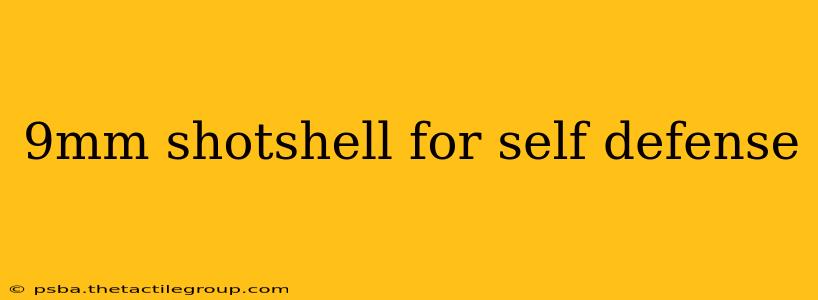The 9mm shotshell is a relatively new contender in the world of self-defense ammunition, offering a unique blend of features that appeal to some, and raise concerns for others. This article will delve into the advantages, disadvantages, and considerations surrounding the use of 9mm shotshells for personal protection. We'll explore the ballistic characteristics, legal implications, and practical aspects to help you make an informed decision.
Understanding 9mm Shotshells
Unlike traditional 9mm ammunition that fires a single projectile, 9mm shotshells launch multiple small projectiles, similar to a shotgun, but in a smaller, pistol-caliber cartridge. This results in a spread pattern, impacting a wider area than a single bullet. Several manufacturers produce 9mm shotshells, each with slightly different projectile counts and designs.
Advantages of 9mm Shotshells for Self-Defense
-
Reduced Overpenetration: The smaller projectiles and wider spread pattern significantly reduce the risk of overpenetration compared to traditional 9mm bullets. This is crucial in close-quarters self-defense situations where unintended harm to bystanders or occupants in neighboring dwellings is a serious concern.
-
Multiple Projectiles: The multiple projectiles increase the likelihood of hitting a target, even if the aim isn't perfectly precise under stress. This is a significant advantage in high-pressure self-defense scenarios.
-
Compact and Convenient: Using a 9mm shotshell allows you to maintain the familiar feel and handling of your existing 9mm handgun, eliminating the need to carry a separate, larger-caliber firearm.
Disadvantages of 9mm Shotshells for Self-Defense
-
Limited Range and Accuracy: The spread pattern inherently limits the effective range of 9mm shotshells. Accuracy also diminishes significantly beyond a few feet. This contrasts sharply with the longer range and higher accuracy of standard 9mm ammunition.
-
Reduced Stopping Power: While multiple projectiles increase the likelihood of hits, individual projectile energy is significantly lower than a standard 9mm bullet. This can potentially result in less stopping power, requiring more shots to neutralize a threat.
-
Potential for Misfires and Jams: Some users report a higher incidence of malfunctions (misfires, jams) with 9mm shotshells compared to standard 9mm ammunition. This is a critical concern in a self-defense situation where reliability is paramount.
Legal Considerations
The legality of using 9mm shotshells for self-defense varies by jurisdiction. Some areas may have restrictions or outright bans on certain types of ammunition, including shotshells. It's crucial to check your local and state laws before carrying or using this type of ammunition. Consult with legal counsel or your local law enforcement agency to ensure compliance.
Choosing the Right 9mm Shotshell (If Applicable)
If, after careful consideration, you decide that 9mm shotshells might be suitable for your self-defense needs, selecting the right product is critical. Look for ammunition from reputable manufacturers with a proven track record of reliability and consistent performance. Always test your ammunition thoroughly in your specific firearm to ensure reliable function and accuracy.
Conclusion
9mm shotshells present a compelling alternative for close-quarters self-defense, especially when minimizing overpenetration is a primary concern. However, it's essential to acknowledge the limitations regarding range, accuracy, and stopping power. Thorough research, careful consideration of your personal circumstances, and compliance with local laws are absolutely crucial before making this ammunition choice. Always prioritize safe and responsible firearm handling practices. This article provides information for educational purposes only and should not be construed as legal or professional advice. Consult with relevant experts before making any decisions related to self-defense and firearm usage.

